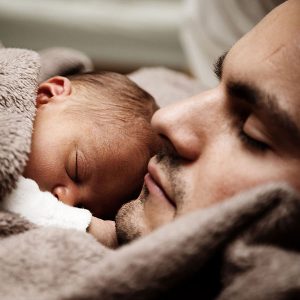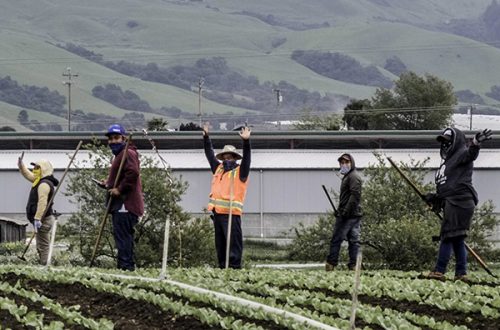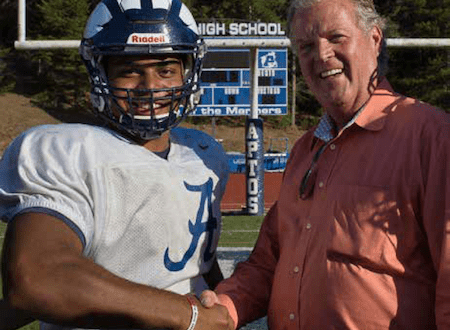When a Father Has to Let Go of His Son
BY JASON GARNER
 Some friends come by for a visit with their 18-month-old. After a few minutes of peek-a-boo and smiles behind daddy, she’s running around the house. Laughing. Falling down. Crying. “Doggie!” She screams and my dog jumps. She runs and cries some more. “TV!” She wants to watch Elmo. I buy an episode. “Melmo!” She giggles, throws her arms up, and sways along. She’s adorable, a tornado, the Energizer Bunny with dimples and a diaper. The whole house is exhausted. “Does this stage last long?” Her mother asks earnestly.
Some friends come by for a visit with their 18-month-old. After a few minutes of peek-a-boo and smiles behind daddy, she’s running around the house. Laughing. Falling down. Crying. “Doggie!” She screams and my dog jumps. She runs and cries some more. “TV!” She wants to watch Elmo. I buy an episode. “Melmo!” She giggles, throws her arms up, and sways along. She’s adorable, a tornado, the Energizer Bunny with dimples and a diaper. The whole house is exhausted. “Does this stage last long?” Her mother asks earnestly.
My son is moving out. He’s turned 20 and over the last year I’ve observed how the safety of our home has become a prison for him. He has new ideas, morals and philosophies. I’ve been careful to allow space for his opinions but we disagree sometimes, which is new for us. He’s told me I’m patriarchal, capitalist, racist. I try to listen and learn, and can sometimes see his point, but mostly I hear, “Dad, I’m leaving,” which is something he hasn’t known how to say another way. He’s found a job in Kentucky, assisting the author and feminist philosopher bell hooks. He adores her, he’s thrilled. He’s leaving in a few days.
I’m happy for him, and I’m sad.
I was meditating recently, sitting in a chair by a window, listening to the flow and fall of a nearby stream. Time disappeared, replaced by the hollow sound of water crashing upon itself. I sat like this for a bit until the thoughts returned. I had a call to make. I reached for my phone on the table beside me and caught a glimpse of my children on the cover of a photo book my wife made one year for Father’s Day. The kids were tender like the fawn of spring. “I miss them,” I thought with a tear and a sudden flash of warmth.
I notice when I say that: I miss my babies, it feels true. I miss holding hands. I miss tickles, silly songs to learn math, the way they gazed at me at night as I tucked them in and told them all the things they could be. When I say I miss them, it’s real. An authentic expression of a slightly broken heart. I also notice when I say how proud of them I am, how my heart is full of joy for the paths they’re uncovering, that feels true too.
“I’m happy and I’ll miss you,” I tell my son. Holding those two truths together is sweet and seems to draw us closer to one another, and to life.
I’ve been through this before, when my eldest daughter moved out and started film school. That was different though. We were following a time-honored path from home to university, and we were battling. I was scared, unsure how to be a dad to a teenage girl. I held on too tightly and the fear closed my heart. I forgot that the young woman in the backseat of the car on the way to high school still needed my love even as she reminded me I was no longer her knight in shining armor. My life was chaotic; I was working hard, marrying, divorcing, “too busy for this shit.” When she moved out we were both relieved. On a recent father-daughter road trip we talked about this. We cried a bit. I’d done my best all those years ago, but defending myself didn’t seem important. My job is to show up with open ears and heart. And she opened her heart too. “I’m sorry and I love you,” I said.
When I moved out, I was driven and righteous, and cruel to my mom. Her life seemed small and I thought there was nothing left for me but to escape. We had a fight late one night and I left for good. I didn’t fully come back until she was dying. By then there were so many other things to say and do that “I’m sorry I was cruel to you” seemed minuscule. I talk to her still. “I’m sorry mom,” I whisper under my breath and wipe my eyes.
Just as I’m thinking how happy I am I don’t have to do this again my 16-year-old pops into the room. She’s flying to LA to see a Harry Styles concert … with my old friends from Live Nation. She’ll dance. They’ll take her backstage. Her heart will swell. She’ll swoon a bit. “The man of my dreams,” she writes in the text below a picture hugging the artist. She grows up just a little on that trip. Moving closer to the day we’ll smile and cry as she moves out too.
Fall is drawing near in the Santa Cruz Mountains. The white-spotted deer who just this spring bounded irresistibly through the oaks, don’t look like Bambi any more, stumbling with their new, awkward antlers. Wild turkeys, prehistoric and gangly, squawk and scratch craters unearthing my daffodils. They bear little resemblance to the chicks that waddled and pecked behind their mothers. Young hawks, shriek on their patrol, performing ineffectual dive bombs on rodents who seem to always be one step ahead. And the amaryllis have sprung to life too, pushing through the soil with an explosion of pink and red.
My son and I drive quietly to the airport in the early morning darkness. The first rays of sunlight strike through the shadows of the redwoods lining the two-lane road to town. Occasionally one of us pats the other on the back or reaches for a Kleenex when the tears get to be too much. It’s notable that life doesn’t require a spectacle – a speech, or grand gesture, or some other dramatic effort – to emphasize a meaningful moment. We sit in silence, without adding or subtracting; sharing the raw feel of moving on … life in all its seasons is enough.
A few questions to explore around growth and goodbyes and being a parent:
What is being known?
In moments of change we might notice the difference between the thoughts in our head and the feelings in our body. Where our thoughts tend to dramatize by adding to the experience, our bodies feel what’s actually going on. We can ground ourselves in the authentic sensations of our bodies through deep breaths, placing our attention in our feet, and mindful physical movement. Aware of our bodies we might ask, “What is being known?” and notice what we find. This is a doorway beyond the world of concepts, into a more authentic experience of our lives.
What is my role?
As our children grow we become aware of how little control we have over their lives. This may be why we cling to images of them in infancy, a time in which it appears we have more control. As they mature our influence lessens. We find ourselves one voice among many – friends, teachers, tweets from around the world, YouTube personalities. We may worry and find ourselves struggling to find our place amidst it all. Wondering, “What’s my role?” or “How do I fit in?” Just knowing we can explore these questions is the beginning of mindfulness. We become aware of areas we’re holding too tightly. We notice the fears we cling to and project onto our children’s lives. It’s safe to let go, to breathe, to allow life to unfold, since that’s what it’s doing anyway.
Who am I?
We’re confronted with the temporary nature of our lives. Our parents age and pass on. Our children grow and move out. Our lives change dramatically from one moment to the next. We’re no longer children, nor quite parents in the way we once were, and we face impermanence head on. The Buddha called this lack of a solid reality emptiness– an acknowledgement that our lives are fluid and ever-changing, that there’s nothing to hang on to. This tends to challenge our sense of self. For me it comes as the question, “Who am I?” This exploration of our identity (or lack thereof) is a classic spiritual pathway. It calls us to look beyond external comings and goings. The question draws us inward to the tender space in our heart, which is ultimately an opening into the vastness ahead.
Where am I going?
We have an interesting relationship with time. We tend to view it as something we move through on our way from here to there. Until, of course, we get there and find ourselves wishing we could go back in time and live it all again. As our children grow we mark milestones and measure against the norms – first steps, kindergarten, middle school, spelling tests, driver’s licenses, did they get into a good school? Then they’re gone, and the moments are gone too, and we might wonder, “Where am I going?” now. The journey is to inhabit this life, to feel your feet on the ground, to breathe the early-morning air, to take in the new orange blossoms on the tree in the park where you email clients as you powerwalk … and to smell the blossoms too. Where we’re going is here.
What’s it like to be me?
Waking up when the kids have grown we might notice the quiet. After years of running around, being on call, caring for others, the stillness can be welcome. It can also be lonely, eerie, and bring up the interesting (and uncomfortable) question,“What’s it like to be me?” This is a gateway to our uncharted inner-life, a calling to explore our own hearts, to show up for ourselves as we have for our children. This exploration can be frightening because it’s about intimacy, the thing we seek, the vulnerability we fear.
Within the darkness there is an unnoticed light. It calls us inward. This is home.
Jason Garner is the author of a book called … And I Breathed: My Journey from a Life of Matter to a Life That Matters Get it at JasonGarner.com








